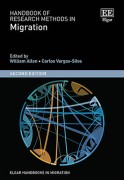MIGNEX Insight
The final milestone: MIGNEX closes with a glowing review

The European Commission has reviewed all our outputs and activities and declared the MIGNEX research project, spanning from September 2018 to August 2024, successfully concluded.
This conclusion was founded on external reviews by leading researchers in the field, who asserted that ‘the project successfully combined academic rigour with practical dissemination strategies, ensuring that its findings reached relevant stakeholders and contributed to both policy and research domains’.
The reviewers praised the way in which extensive data have been collected to high standards, carefully documented, and made available for secondary use. They also affirmed that the project ‘has been managed in an exemplary fashion’ with the result that ‘resources have been utilised very effectively’.
The scientific impact of the project is being consolidated through articles in peer-reviewed journals. The reviewers pointed to ‘an excellent piece in World Development’ and encouraged the ongoing work with additional articles.
When the MIGNEX consortium started the project, it was driven by one overarching objective: Contribute to more effective and coherent migration management through evidence-based understanding of the linkages between development and migration.
MIGNEX was carried out by a consortium of nine partners: Peace Research Institute Oslo (coordinator), Danube University Krems, University of Ghana, Koç University, Lahore University of Management Sciences, Maastricht University, the Overseas Development Institute, the University of Oxford and Samuel Hall. Over six years, approximately 90 individuals contributed to the project's success.
MIGNEX researchers collected data in 26 research areas across 10 countries, engaged with 13,174 young adults through surveys, conducted 104 focus group discussions with 646 participants, 516 key informant interviews and 168 policy expert interviews – meaning talking in one way or another with over 14,500 people.
The breadth and depth of the data collection is unique and has proven to be valuable in developing rich and fresh insights. In addition to standard approaches for analysing data, the project employed innovative approaches such as multi-level analysis, mediation analysis and qualitative comparative analysis.
One of the main things we learnt is that migration can mean different things in different contexts, and that the drivers and impacts of migration are more divergent than similar across research areas. There were few “universal” lessons across all research areas. This means that the cross-area research design was very insightful.
In total, MIGNEX has produced over 80 publications during its lifetime, each serving different purposes and audiences.
The MIGNEX reports are our flagship publications presenting our key finding in a comprehensive but non-technical way. They synthesise the major findings of the MIGNEX project on fundamental questions, and draw on a range of preceding MIGNEX publications.
The other main publications were:
-
MIGNEX Policy Briefs (10) focusing on selected findings of particular relevance to the policy community
-
The MIGNEX Handbook Chapters (14) have played a key role in the day-to-day administrative and scientific management of the project. Initially intended largely for internal use, they have also been hugely successful with academic and research audiences due to their level of technical detail and their applications to guide future research practices
-
MIGNEX Background Papers (29) are scientific papers documenting the findings and providing foundation to other outputs
-
MIGNEX Case Study Briefs (26) document migration dynamics in each of research areas.
-
Academic articles (8 and more to come).
As there was a lot of interest in our methodological approaches, we create a training portal where students and other researchers can learn more about data collection, research communication and even project management. We also created a MIGNEX YouTube Channel that comprises 27 videos in total.
All the publications will remain indefinitely available on Zenodo, ensuring their continued utility for policymakers and researchers. The MIGNEX website will stay live until 2026.
We hope that the data we gathered in MIGNEX will guide policy makers and academic researchers for years to come!


